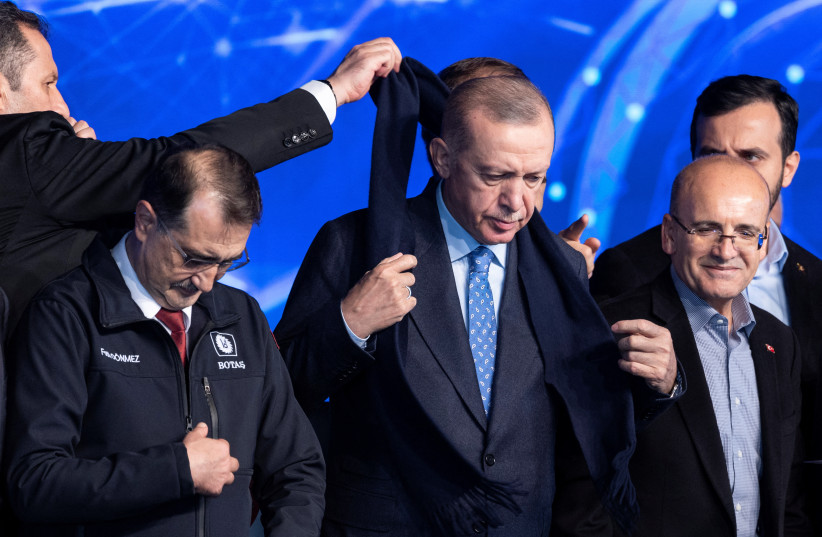Turkey has been one of the world’s leading jailers of journalists for the last decade. However, much of its rising authoritarian agenda has gone unchallenged because Western countries have been focused on China and Russia.
Amid the Ukraine war, Ankara has positioned itself as a friend to both sides, working with Russia on trade while also working with Ukraine. This means it presents itself as a broker, so that the West needs it and is afraid it will drift further into the Russian camp. Now Ankara has tried to prevent democracies from joining NATO, and is targeting journalists abroad and opposition figures at home.
Swedish intervention
Sweden’s Supreme Court stepped in this week to block the extradition of a journalist to Turkey. Sweden wants to join NATO, and Ankara has tried to force Stockholm to extradite dissidents and silence critics in order to join NATO.
NATO was once an alliance of the world’s Western democracies. However, as Turkey’s ruling party became more authoritarian and cracked down on journalists, it has exploited its membership of NATO. Turkey has, for instance, exploited refugees to threaten Europe in an effort to get funding. Turkey often threatens fellow NATO-member Greece.

Ankara is now trying to keep democratic Sweden and Finland from joining the alliance. Ankara’s blackmail involves trying to force those countries to crack down on dissidents from Turkey, including refugees and asylum seekers.
Sweden appeared ready to give in to most of Ankara’s demands, until Sweden’s courts stepped in. This shows that Western countries are often willing to bend their values and ditch decades or hundreds of years of democracy to please a foreign authoritarian regime. Only things like courts stand in the way and help protect human rights and journalists’ rights.
According to The Guardian, the court said, “There is also a risk of persecution based on this person’s political beliefs. An extradition can thusly not take place... the government... is not able to grant the extradition request.”
It is unclear why Sweden was ready to extradite a journalist in the first place. Its Foreign Ministry has now also said, “If the Supreme Court declares that there are hindrances to an extradition in an individual case the government has to deny the extradition request.”
Asylum seekers who received asylum in the West have often believed Western democracies would not give them up for short-term gain. The issue of Sweden and Finland joining NATO may be different because of Russia’s aggression against Ukraine. These countries now fear their own security.
But if they hand over minorities and asylum seekers, will they not have betrayed the very values they believe they are struggling for in the face of Russian aggression? That is a key question now that Sweden’s courts have stepped in. Will Ankara be able to continue to bully NATO, and will NATO’s democracies continue to outsource their foreign policy and membership to Ankara, enabling it to veto membership of democracies unless those democracies become more authoritarian?
Ankara’s ruling party (the Justice and Development Party, or AKP) has also hollowed out Turkey’s judicial system, and uses it to imprison opposition members. Recently, a Turkish court sentenced Istanbul’s mayor, who is a member of the main opposition party, to two years in prison for “insults.” The alleged insult was calling someone a “fool.”
The fact that people can be sentenced to prison in Turkey for many years merely for using words like “fool” makes Turkey one of the leading authoritarian regimes in the world.
Ankara appears to be going after more and more opposition figures. People don’t even protest these rulings in Turkey, fearing repercussions. Many protest leaders from various movements, going back a decade, have found themselves imprisoned for their statements, posts or actions from many years ago.
Will the West see a breaking point?
As Ankara trends toward more authoritarianism, it is unclear if Western countries will see a breaking point. So far, the West has preferred silence, worried that Ankara will become an even closer partner of Russia at a key time in the Ukraine war. For countries like Greece that are often at the receiving end of Ankara’s threats, this is a worrisome trend.
Turkey has been carrying out widespread airstrikes in Eastern Syria and threatens US partner forces that were fighting ISIS. In addition, politicians from Turkey’s ruling party threatened Greece with missile attacks. Most countries don’t threaten their neighbors with missile attacks. The exceptions are generally Iran, Russia and North Korea, which either openly threaten or use missiles against their neighbors.
In another recent provocation, Turkey claimed to send planes into Greek airspace as part of a NATO drill. As with the requests to get Sweden to extradite critics, Ankara uses the cover of its membership in NATO to harass Greece.
This continues to erode the unity of NATO and makes it hard for democracies threatened by Moscow to join the alliance, which was specifically created to help Western democracies unite against authoritarian adversaries like Russia.
